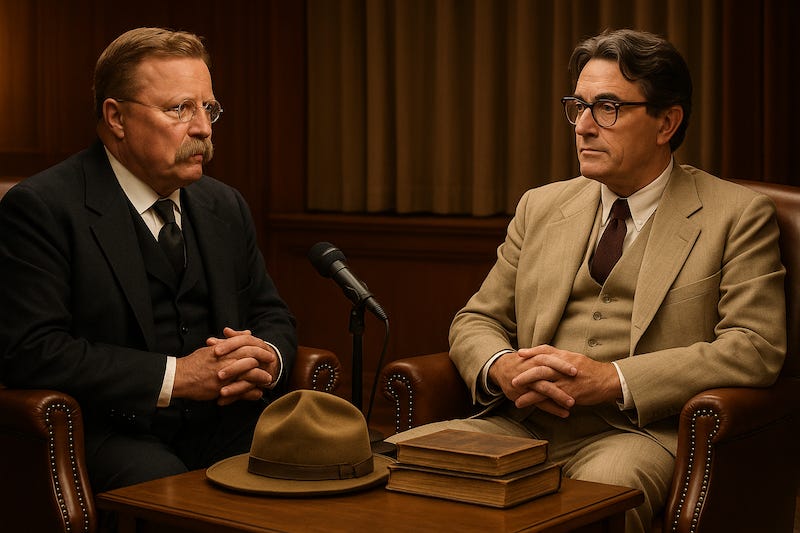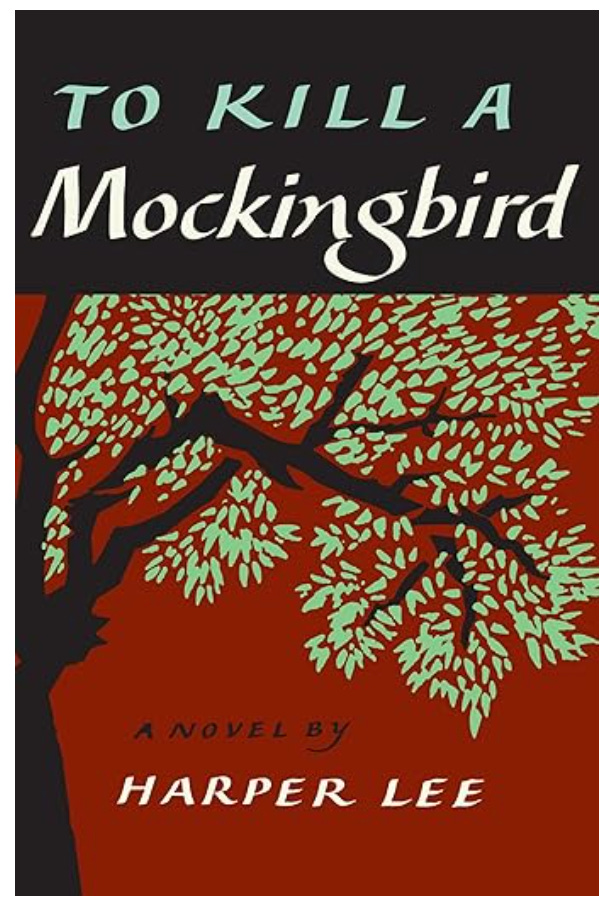Theodore Roosevelt & Atticus Finch Discuss the Current State of Liberal Politics
A trans-era conversation via ChronoTranscriptor™ – Static fluctuating between Sagamore Hill and Maycomb County, Alabama.
[Host Introduction]
What happens when you bring together two legendary defenders of justice—one a Rough Rider president, the other a small-town attorney who stood tall against bigotry?
We summoned Theodore Roosevelt and Atticus Finch to weigh in on the current state of liberal politics. The two don’t always agree—but when they do, their words cut through the fog like lanterns on a dark road.
Let’s listen in.
[Dialogue Begins]
Host: Gentlemen, thank you both for joining us. We’re here to discuss modern liberalism—specifically the criticism that it’s become reactive, self-referential, and too comfortable preaching to the converted. President Roosevelt, would you like to start?
Theodore Roosevelt: With pleasure. Let me be plain: complaining is not governance. It’s a symptom of lost purpose. The moment a party spends more time on television than in tenement houses or out west where people work with their hands, it forfeits the right to call itself a movement.
Atticus Finch: I don’t disagree, Colonel. But I’d add that outrage alone doesn’t make a just society. We can’t let anger become a substitute for courage—or compassion.
TR: Agreed, Mr. Finch. But you also can’t bring a stern lecture to a gunfight. The opposition plays dirty, and too many liberals insist on responding with dinner-party etiquette. That’s not strategy—it’s self-soothing.
Atticus: True. But we must keep our compass steady. If we sacrifice principle for power, we lose what we claim to protect.
TR: And if you don’t fight for your principles, you’ll watch them get trampled beneath jackboots. Let me ask you, Atticus: what good is moral clarity if it never leaves the courtroom?
Atticus: It must walk into homes, into churches, into voting booths. That’s where change begins. But I’ll always believe the tone matters. We must not become what we oppose.
TR (leaning in): Nor must we become decorative. The people don’t need more op-eds—they need leadership that sweats. Roll up your sleeves, knock on doors, look folks in the eye. Don’t just tweet about injustice. Out-organize it.
Host: Some say liberals spend too much time responding to Trump and the MAGA movement. Thoughts?
TR: When you let the other man set the battlefield, you’re already surrendering. Make your own map. Don't chase shadows—light your own path.
Atticus: I often told Scout that courage is "when you know you’re licked before you begin, but you begin anyway." Liberals forget that. They want to feel righteous. They need to be brave.
Host: So what do you both suggest?
TR: Build institutions. Fund local news. Get union halls humming again. Be loud, be proud, and stop waiting for permission.
Atticus: And while you’re doing all that—listen. Truly listen. Justice doesn’t flow from victory alone. It flows from empathy—and the ability to hold power accountable, even when it’s your own side.
Host: One last word from each of you.
Atticus: Let your integrity walk ahead of your politics.
TR: Speak softly when you must—but carry a damn bigger stick than your opponents expect.
[Closing]
Two icons—one with a clenched fist, the other with an open hand—remind us that effective liberalism must feel and fight. It must win minds without losing hearts, and battle injustice with both action and conscience.
On the next ChronoTalks, we bring back Ida B. Wells and Edward R. Murrow to discuss journalism in the era of disinformation.
Until then—stay loud, stay grounded, and never confuse caution with conviction.
Harper Lee’s Pulitzer Prize–winning masterpiece of conscience and courage in the Deep South returns in a beautifully packaged deluxe hardcover edition—available for a limited time.
To Kill a Mockingbird, one of the most beloved and enduring novels of all time, has been translated into over forty languages, sold more than forty million copies worldwide, and inspired an acclaimed motion picture. Voted one of the best novels of the twentieth century by librarians nationwide, it remains a touchstone of American literature.
Set in a town seared by prejudice and injustice, this gripping and profoundly moving coming-of-age story is told through the eyes of a young girl. As her father—a principled lawyer—risks everything to defend a Black man falsely accused of a terrible crime, she witnesses both the quiet heroism and the destructive hatred that shape her world. More information…




